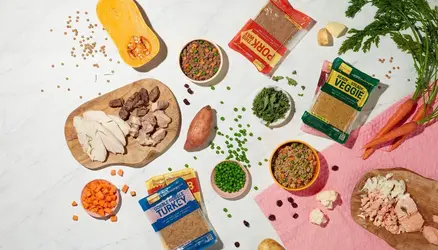Best Dog Food for Colitis
- 08 Aug 2023
- 5m read

Dogs are our best friends, and when it comes to their health, we want to make sure they’re getting the best care possible. If your pup is suffering from colitis, you may be looking for solutions to help them feel better.
In this article, you’ll learn about the symptoms of colitis in dogs, potential causes and breeds prone to developing it, as well as treatments and dietary recommendations.
Symptoms of Colitis in Dogs
Colitis is a common condition in dogs that can be both uncomfortable and potentially dangerous. Symptoms of colitis in dogs include:
- Bloody or mucus-covered diarrhoea
- Vomiting
- Abdominal pain
- Loss of appetite
- Lethargy
- Weight loss
- Dehydration
- Anemia
Any dog can develop colitis but some breeds are more prone to the condition than others.
In some cases, colitis can be a sign of more serious underlying diseases such as inflammatory bowel disease (IBD). If your dog shows any sign of these symptoms it is important to contact your vet for early diagnosis and treatment so that the condition does not worsen. This is especially the case if you have a puppy or senior dog, as they may be at higher risk for developing complications from colitis.
What Causes Colitis in Dogs?
When it comes to colitis in dogs, there are a number of potential causes and triggers that should be taken into consideration.
- An imbalance of certain bacteria in the intestine often caused by changes in diet or environment, as well as certain parasites like Giardia
- High-fat or high-fibre foods
- Certain medications
- Stressful environmental changes, such as a move or new pet introduction
It is important to regularly check for worms and parasites if your pup is exhibiting signs of colitis, and if an underlying medical condition exists then further testing may be recommended for diagnosis purposes.
Dog Breeds Prone to Colitis
Colitis is a common gastrointestinal disorder that affects dogs of all breeds and ages. While any breed can be prone to colitis if they possess a sensitivity to certain types of food or have allergies, there are some breeds that may be more susceptible due to their genetic makeup.
German Shepherds, Labrador Retrievers, Bulldogs, and Golden Retrievers are some of the most commonly affected breeds. Studies have shown that German Shepherds may be particularly vulnerable because they have an increased number of inflammatory cells in their intestines. This makes them more prone to developing colitis than other breeds.
It is important for owners to monitor their dog’s diet carefully and watch for signs of colitis such as bloody or mucous-covered diarrhoea, vomiting, abdominal pain, and loss of appetite. If you notice any changes in your pup's behaviour or diet, it is important to consult with your vet as soon as possible to ensure proper diagnosis and treatment.
How to Treat Colitis in Dogs
When it comes to managing colitis in dogs, consulting with your vet should be your first priority. A vet can provide an appropriate treatment plan that may include medications and dietary changes. It is important to ensure that your pup's diet is high in fibre and low in fat to prevent triggering symptoms of colitis. Exercise should also be incorporated into their daily routine, but with plenty of rest periods during the day.
In addition to these measures, certain supplements can help ease digestive discomfort associated with colitis. Probiotics are beneficial for restoring balance in the gut flora while omega-3 fatty acids have anti-inflammatory properties and can reduce inflammation from within. Slippery elm or aloe vera juice can also be used to soothe irritated intestines and provide relief from any pain associated with the condition.
Fortunately, there are now tailored meal plans available specifically designed for dogs suffering from colitis - such as Butternut Box. Our recipes use fresh ingredients formulated just for your pup's needs; making it easy for pet parents to ensure their pup gets all the nutrition they need while living with this condition.
What Not to Feed Dogs with Colitis
When caring for a dog with colitis, it is important to pay close attention to their diet and avoid certain ingredients that may further irritate the intestines. Processed foods such as canned food, kibble, and treats should be avoided due to their high levels of preservatives and fillers which can be hard on the delicate intestinal lining.
Greasy or fatty foods, foods with high sugar or salt content, and common allergens including wheat, corn, soybeans, dairy products, eggs, beef, chicken, fish and other animal proteins should all be eliminated from your pup’s diet.
If you find yourself unsure what the best dietary options are for your specific situation it may be beneficial to consult a vet who specialises in canine nutrition for advice on how to create a balanced meal plan tailored specifically toward your pet's needs. With the right nutritional plan in place you can help ensure that your pup remains healthy despite living with colitis so they can live life just like any other pup.
Why Butternut Box is Perfect for Dogs with Colitis
For pups with colitis, Butternut Box is a great nutritional solution. Many of our meals can help dogs with colitis as they contain lots of beneficial ingredients, such as omega-3 fatty acids that reduce inflammation. The meals are pre-portioned based on their age, weight, breed and activity level to give them the nutrition they need.
Additionally, we never use common allergens or artificial flavours, preservatives or additives, so pups with sensitive digestive systems can enjoy healthy food without worry of flare ups or reactions.




